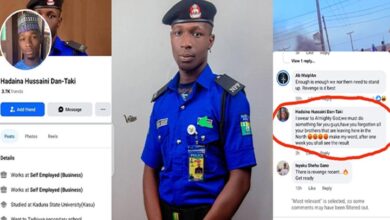Wike Issues Fresh Warning to Sowore as Battle Deepens

(DDM) – Arise Television anchor Rufai Oseni has strongly criticised Rivers State Governor Siminalayi Fubara over his recent peace comments.
Diaspora Digital Media (DDM) gathered that Oseni, in a Saturday post on his X handle, faulted Fubara’s message as a sign of weakness.
The outspoken journalist argued that the governor was “bullied and subdued” after months of bitter political tension in the oil-rich state.
“Fubara is celebrating peace of the graveyard,” Oseni wrote in his strongly worded reaction.
He added that the governor’s comments contrasted sharply with his past statements, when he resisted political interference in Rivers.
“Peace is better than war he says. Play back all his tapes for him,” Oseni mocked in the viral post.
The criticism followed Fubara’s statewide broadcast on Friday, where he addressed Rivers residents on the outcome of months of crisis.
In his message, the governor urged citizens to reflect on the impact of the six-month emergency rule declared by President Bola Tinubu.
Fubara insisted that “the costliest peace is cheaper than the cheapest war,” stressing that confrontation would only worsen Rivers’ instability.
He said his decision to avoid legal battles and cooperate with the Federal Government was motivated by a desire to preserve order.
The governor argued that political fights would have distracted from governance and slowed down development projects across the state.
However, Oseni’s intervention rekindled debate about whether Fubara’s new posture represents pragmatism or capitulation to external pressure.
Rivers State, one of Nigeria’s most politically volatile regions, has long been the theatre of intense power struggles.
The state’s enormous oil wealth, strategic position, and voting strength have made it a key prize for political actors.
Since the Fourth Republic began in 1999, every governor of Rivers has faced crises that shaped their tenure and legacy.
Former Governor Peter Odili’s administration witnessed frequent clashes between militants and federal authorities over oil resources.
Rotimi Amaechi, who succeeded Odili, battled through court cases and political confrontations before securing his mandate.
Amaechi’s tenure was also marked by open conflicts with the Federal Government during the Goodluck Jonathan presidency.
His successor, Nyesom Wike, was known for fiery rhetoric, open defiance of Abuja, and confrontations with opposition politicians.
Wike, now a minister in Tinubu’s government, played a crucial role in installing Fubara as his political heir.
But within months, the alliance collapsed, and Rivers became the stage for a fierce political battle between godfather and godson.
The situation escalated to the point that President Bola Tinubu imposed emergency measures, suspending Fubara for six months.
A caretaker arrangement was created, heightening fears of instability in a state crucial to Nigeria’s oil economy.
Fubara’s reinstatement came with conditions that many believe forced him into a softer political stance.
Analysts say the governor now operates under the shadow of Abuja’s influence and Wike’s continuing political relevance.
This context explains why Oseni’s words resonated widely among Rivers residents who still feel disenfranchised by the crisis.
Civil society organisations in the state have warned that peace without justice will only breed more resentment.
Some groups argue that the “graveyard peace” Oseni described reflects silence enforced by fear rather than genuine reconciliation.
Others believe Fubara’s approach is pragmatic, insisting that Rivers people need stability more than endless political warfare.
Oseni, known for blunt commentary on national issues, framed the matter as one of dignity and leadership strength.
His remark drew mixed reactions online, with some praising his courage and others defending the governor’s call for calm.
Supporters of Fubara insist that peace, even if imperfect, creates the breathing space needed for governance.
They argue that road projects, security coordination, and youth empowerment initiatives are already being revived under calmer conditions.
Critics, however, insist that the emergency rule was unconstitutional and that its legacy cannot be ignored in Rivers politics.
The fear among many is that unresolved tensions between Wike, Fubara, and Abuja will resurface ahead of the 2027 elections.
Rivers, with its massive voter base, has historically played a kingmaker role in presidential and party primaries.
Any instability in the state is seen as a threat to Nigeria’s wider democratic process and oil revenue stability.
Observers say Oseni’s criticism signals that the national spotlight will remain firmly on Rivers politics in the coming months.
For Fubara, the challenge remains how to prove that peace in Rivers is genuine, durable, and not simply imposed from above.
As the debate continues, the governor’s legacy may depend on whether he can strike a balance between peace and independence.
For now, his critics like Rufai Oseni insist that history will remember if the current calm is built on silence, not justice.
Post Views: 78





